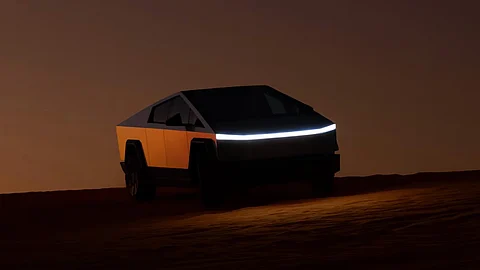

In a twist of irony, that only the 21st-century energy transition could deliver, electric carmaker Tesla has officially launched its line of cars and Cybertrucks in the second-largest oil-producing country on Earth.
That would be the Kingdom of Saudi Arabia.
The Thursday grand opening of Tesla’s first showroom and service centre in Riyadh, — complete with a sleek Cybertruck plowing through desert sand on a mega screen — marks a milestone in the EV maker’s short history and global rollout.
But it also underscores an ironic moment in automotive geopolitics, where the world’s biggest champions of oil are now embracing the battery-powered vehicles that threaten to replace it.
At the centre of it all is Elon Musk, the bombastic billionaire whose relationship with the Saudi royal court has been as volatile as the price of a barrel of crude.
Back in 2018, Musk famously claimed he had “funding secured” from the kingdom’s sovereign wealth fund to take Tesla private.
But that deal evaporated faster than water on a Riyadh roadway, leading to lawsuits, investor fury and a very public feud with fund chief Yasir Al-Rumayyan — who also happens to be a member of the House of Saud — on Twitter (“X”).
“You are throwing me under the bus,” Musk Tweeted at the time. And that was before Musk owned the social media platform.
Fast forward to 2025, and Tesla’s Cybertruck is rolling into Saudi showrooms while Musk, Trump, and Al-Rumayyan were spotted ringside at a UFC fight earlier this year smiling like old friends.
While the royal family appears to have buried the hatchet, Tesla still has sand dunes to scour before it can become a major player in the country’s automotive sector.
That’s because Saudi has just 101 EV charging stations across its vast territory — most belonging to royals — including a grand total of zero along the 900-kilometer highway connecting the capital Riyadh with Mecca.
And while Saudi Arabia is aiming for 30% of cars to be electric by 2030, it’s starting from a literal crawl. Total EV sales amounted to just 2,000 units for all of 2024 or about as many Teslas as Musk’s California factory produces in a day.
Then there’s the competition. Tesla rival Lucid Motors is majority-owned by the Saudi Public Investment Fund and is already building EVs in Jeddah.
Chinese brands like BYD and Zeekr are also muscling in, offering a less politically-charged alternative to Musk’s increasingly polarizing persona in the US.
Tesla, meanwhile, is grappling with serious financial headwinds including falling sales and a sagging stock price that has lopped nearly USD$400 billion of its market cap since the US elections last November.
First-quarter global sales dropped 13%, the company’s worst showing in nearly three years. In Europe it’s more like 70% in countries like Germany.
Analysts blame consumer fatigue with Musk’s political antics — including his high-profile role in Donald Trump’s re-election campaign and controversial appointment as head of the Department of Government Efficiency (DOGE), where he’s been gleefully slashing federal jobs and contracts with a chainsaw in hand.
Musk’s absence from the Saudi launch, where he’s hailed as a visionary Demigod, didn’t go unnoticed. “I was very close to the stage, but unfortunately he didn’t come,” lamented a visibly crestfallen Cybertruck fan, as per Reuters.
But even if he was a no-show in Riyadh, his presence loomed large. In a kingdom trying to pivot from petrodollars to EVs, Tesla is both a symbol of that shift and a reminder that the road to ‘Vision 2030’ is a long and hot ride.
Just don’t forget to pack a portable charger.
